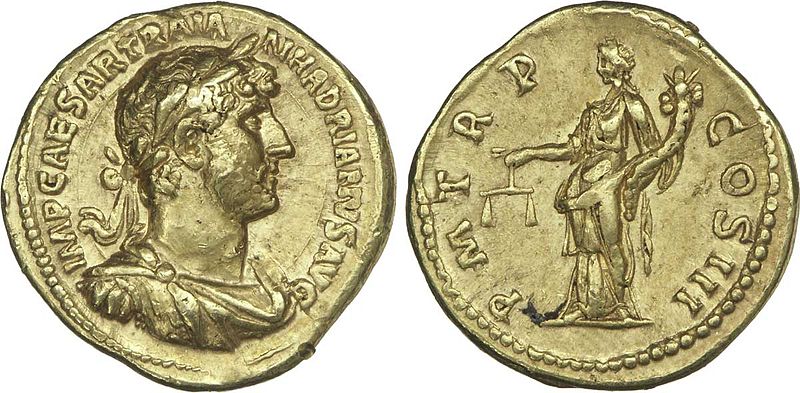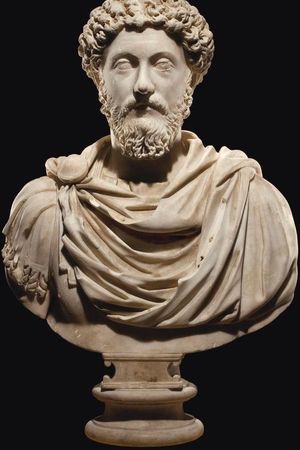Publius Aelius Traianus Hadrianus
Publius Aelius Traianus Hadrianus, better known as Hadrian (lat. Publius Aelius Traianus Hadrianus) - Roman Emperor in 117-138 AD. He received tribunician power 22 times (twice in 117: August 11 and December 10, then annually on December 10). He was proclaimed Emperor twice: on August 11, 117 AD and in 135 AD. He was consul in 108, 118, and 119. His full title at the time of his death was: Emperor Caesar Traianus Hadrianus Augustus, Pontifex Maximus, vested with the power of the people's tribune 22 times, twice Emperor, three times Consul, Father of the Fatherland (lat. Imperator Caesar Traianus Hadrianus Augustus, Pontifex Maximus, Tribuniciae potestatis XXII, Imperator II, Consul III, Pater Patriae). The third of the five good emperors.
He was born on January 24, 76 in Italica near modern Seville, died in Spain on July 10, 138 in Baiae near Naples.
Before coming to power
Hadrian was the son of the Roman senator Publius Aelius Afer, whose ancestors moved from Adria to Italica in the time of Scipio, and Domitia Paulina. Hadrian's father held the office of praetor in Rome and died when Hadrian was ten years old. Hadrian was raised under the guardianship of his cousin, Emperor Trajan, on whose granddaughter's granddaughter he married in 100 AD. Hadrian was the first to tell Trajan, who was in Colonia Agrippina, about the death of Nerva. He participated in the wars with Decebalus, was twice awarded for bravery, and was elected to the Senate. During the second campaign against the Dacians, Hadrian fought with the Sarmatians beyond the Danube. In 108 AD, he became a consul. A few years later, he fought in Armenia and Mesopotamia, being a legate at Trajan's headquarters, but did not accomplish anything outstanding. Nevertheless, when in 117 the governor of Syria was sent to Dacia to suppress the disturbances that had arisen there, Hadrian was appointed his deputy, which gave him independent command over the troops.
Trajan, seriously ill by that time, decided to return to Rome but only reached the Cilician city of Selinus, where the disease prevented him from going any further. He was taken care of by his wife, Plotina, one of Hadrian's supporters, who was one of the obvious candidates to succeed Trajan but was not formally adopted by him. The dying Trajan adopted Hadrian, but since the document was signed by Plotina, it is assumed that Trajan was already dead by this point. Hadrian learned of Trajan's death on August 11, 117, the Syrian legions proclaimed him emperor, but he was forced to delay in Syria for some time, as the complicated situation there required.
An excerpt from the book "The History of the Augustus":
"He was tall, distinguished by his external grace, he curled his hair with a comb, let his beard grow to hide the natural imperfections of his face, and had a strong physique. He rode a lot and walked a lot, always exercising with weapons and spears. While hunting, he very often killed lions himself. During hunting, he broke his collarbone and rib."
Hadrian had no children of his own. Hadrian's greatest love was a young man named Antinous. Hadrian met Antinous in 124 when he was traveling through the province of Bithynia in northeastern Asia Minor. From 128, the young man was constantly with the emperor. In 130, when they were in Egypt, Antinous drowned in the Nile. The circumstances of the tragedy were mysterious and gave rise to many rumors. It is known for certain that Hadrian's grief was inconsolable, and he ordered the priests to deify Antinous. At the site of his favorite's death, Hadrian founded the city of Antinopolis (Antinoopolis), where games were held every year in honor of the young god.
Reign
Hadrian's policy differed greatly from Trajan's policy of conquest. First of all, Hadrian gave up Assyria and Mesopotamia, returning them to the Parthians. Armenia also left the number of provinces and began to be considered only a protectorate of Rome. Having resolved all the problems in the East, the emperor left Antioch in the fall of 117. But he did not head to Rome, but to the lower Danube, where it was necessary to resolve the claims of the Roxolani who violated the borders of Dacia. Messengers arrived from the capital with the message that a conspiracy had been uncovered in Italy, led by Lucius Quietus and Trajan's associates. Soon Quietus himself was executed. But fears that Hadrian would rule in the spirit of Nero or Caligula did not come true. Hadrian appeared in Rome in the summer of 118, he was greeted with great honors. In addition to the traditional magnificent spectacles, a posthumous entry was arranged for Trajan, whose statue stood on a chariot.
Hadrian stayed in the capital for three years, after which he set off on his first journey - to Gaul and the provinces along the upper Rhine and Danube. In the triangle between these rivers, the emperor strengthened the fortification system. The following year he went to Britain, where work began on the construction of Hadrian's Wall. In 122, the emperor returned to Gaul. In the south, in Nemausus, he erected a temple in honor of Empress Pompeia Plotina, who had passed away shortly before. Hadrian spent the winter of 122-123 in Spain, then went to Africa, to Mauretania. There he received news of a war threatening Rome with Parthia and he rushed to the scene. Hadrian managed to defuse the situation through negotiations, but was forced to stay there until 124. He visited Antioch and Palmyra. In 124, the emperor toured the Balkan provinces of Rome, and the city of Adrianople in Thrace was founded by him. In the winter of 124-125, Hadrian decided to spend time in Athens. The following year he was initiated into the Eleusinian Mysteries. Hadrian returned to Italy via Sicily, where he climbed Mount Etna to admire the sunset. The emperor stayed in Rome until the summer of 128, then went back to Africa. In Numidia, he inspected a military camp and watched infantry and cavalry exercises. Then, through Asia Minor, he went to Syria, where he climbed Mount Cassius. In 130, Hadrian visited Jerusalem, which had been in ruins since 70, and decided to build a city named Colonia Aelia Capitolina on this site, and to erect a temple in honor of Jupiter Capitolinus on the site of Solomon's temple. Then the emperor's journey lay to Egypt, where his favorite Antinous drowned in the Nile. On November 21, 130, Hadrian visited the monument of the singing Memnon. The return route went through Syria and Asia Minor. When Hadrian was about to leave Athens for Rome, he received news of a new uprising of the Jews, which was suppressed with great difficulty.
 Coin with the face of Hadrian, 2nd century AD.
Coin with the face of Hadrian, 2nd century AD.
The new emperor paid special attention to the economic development of the provinces. Theatres, libraries were being built across the country, cities were decorated with statues. In Rome, the Pantheon, Hadrian's Mausoleum (now called the Castle of the Holy Angel), the Temple of Venus and Rome were built, the famous villa was constructed in Tibur, and a canal was built from Stymphalos to Corinth. Hadrian highly valued Greek culture, encouraging the arts, poetry, philosophy. The Emperor adorned his favorite city, Athens, with magnificent buildings, including, for example, the Temple of Olympian Zeus. He also took care of strengthening the northwestern borders of Germany and Britain, where he erected the so-called Hadrian's Wall (in 122) and reinforced the troops. In Italy, Hadrian completed Claudius' project to drain the Fucine Lake. He created a council at his person. Italy was divided into four parts with four imperial consuls, and only Romans were appointed to state posts.
The last major event of Hadrian's was the codification of Roman law, conducted jointly with the lawyer Salvius Julianus. In 138, the emperor fell seriously ill. Suffering from the disease, he took a large dose of medicine and died in Baiae on July 10, 138, leaving the adopted Antoninus Pius as his heir. Before his death, he wrote himself an epitaph:
"Quivering soul, tender wanderer, Guest and friend in the human body, Where are you wandering now, Weakened, shivering, defenseless, Unable to play as before?"
Under Hadrian, a powerful system of defensive fortifications was built. The most famous was Hadrian's Wall in Britain, stretching 117 km. Special attention was also paid to the Rhine and Danube borders: fortresses were built, watchtowers were placed, camps were established, protected by walls and connected by roads, so that in case of a barbarian invasion, reinforcements could quickly arrive. A moat and a road were laid from the barbarian territory, and a road from the Roman side.
In such a situation, part of the legions were increasingly being stationed on the borders and becoming less mobile. Under Hadrian, the legions began to include local inhabitants of the provinces, who until yesterday were considered barbarians. In addition, a new light unit appeared, consisting of local militia - numeri, armed with their own weapons. The proportion of people from Italy in the army decreased.
During this period, the Roman army instilled fear in the barbarians and they did not dare to violate the border, Hadrian's rule passed peacefully, with the exception of minor border conflicts. The main military campaign of Hadrian was the suppression of the Jewish uprising of 131-135. The compatriots from Egypt and Libya joined the rebels in Palestine. For a long time, the Roman army could not achieve success, the rebels captured Jerusalem, fortified many fortresses and hills. To suppress the uprising, the best general of that time, Sextus Julius Severus, was sent from Britain. Avoiding major battles, Severus besieged and destroyed one fortress after another by starvation. As a result, Jerusalem was captured and destroyed, and the leader of the rebels, Bar Kochba, died. In the battles alone, 580,000 Jews were killed, 985 villages and 50 fortresses were captured. Hadrian did not accept the triumph from the Senate, but accepted the title of Emperor from the army for the second time. After this uprising, there were no more major protests in Palestine. The Jews of the empire were burdened with even greater taxes.
 Borders of the Empire during the reign of Hadrian
Borders of the Empire during the reign of Hadrian
Related topics
Roman Empire, Emperors of Rome, Reign of the Antonine dynasty, Marcus Ulpius Nerva Trajan



